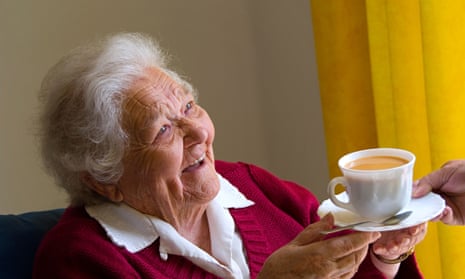For as long as I can remember, my auntie Marie, a nurse of 46 years, has been one of those fiercely caring people who knows what’s best and will go above and beyond to deliver just that. I was lucky enough to grow up in a family of hard workers with big hearts, just like Marie. When her mother (my nan), a gentle little lady from County Kerry, Ireland, developed Alzheimer’s disease, my mum and our loud, bossy and loving family pulled together. We all committed to providing her with care in her family home until she passed away 14 years later.
I think it’s important to mention how challenging and exhausting this was at times for all of my family: there were more than a few arguments. Yet their love and determination to provide my nan with care to the best of their abilities never faltered. I have no doubt that my early observations of this wonderful example of care and my family’s continuing commitment played a key role in my calling to join the adult social care sector.
That’s the thing I love most about social care, you witness and gain an insight into precious, authentic moments of real life and real struggles. For the person who requires support, you can play a role in making their days fulfilling, gentle and good fun. By default, the purpose and ambition of social care is what makes it inspirational work: enabling people to live their lives as closely as possible to how they used to, before they needed support. You have to build a strong, trusting relationship as a care provider. You also have to have thick skin along with the ability to make a joke and a cup of tea during some of the most challenging circumstances.
In October 2014, I was delighted to join the graduate management scheme with National Skills Academy for Social Care and start a year’s placement with the Care Quality Commission (CQC). I am thoroughly enjoying the challenge of a steep learning curve and the remarkable learning, networking and development opportunities that this brings. Already, the scheme has opened my eyes to the challenges facing the sector, while simultaneously providing me with the skills to complement and “action” my ambition to help overcome these challenges.
My placement with the CQC provides me with regular reassurance that both the profile and standard of adult social care will continue to rise. It is a fascinating time of development within the CQC. The people I work alongside demonstrate true commitment to both demanding and praising good-quality care; anticipating and adapting to developments within the sector, and closely working alongside experts, the public, care providers and service users in order to continue to learn and improve as an organisation.
I regularly witness the admirable and promising dedication of inspectors, teams and leaders who demonstrate a natural belief that care standards must not only be high, but also tailored to the needs of the individual. I am confident that this mentality will continue to grow within and across the sector.
It is an interesting time for adult social care. Some care providers are now working directly towards achieving an outstanding care rating and there are a number of new initiatives including the introduction of the Care Act, the Care Certificate, Social Care Commitment and Skills for Care I-Care Ambassadors.
There are, of course, a number of challenges facing the sector. While in many ways we have a long way to go, in my view this is all the more reason to keep going. We must be brave and determined enough to think differently and make sure our words are brought to life, through meaningful actions that are focused on people. I think a key lesson is an emphasis on the importance of personalised care. As people, our lives are made up of routines, hobbies, memories, favourite foods, music and funny little characteristics that help to define who we are. These are things that shouldn’t go off the agenda just because a person happens to require care.
In my future career, my aim is to be a part of these exciting changes and share these key lessons, channelling my passion for social care and the purpose of CQC in the process. I have no doubt that my initial spark and love for the sector will enable me to remain inspired despite the challenges that this may bring.

Comments (…)
Sign in or create your Guardian account to join the discussion